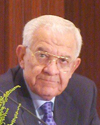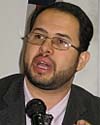The Arab Center for Research and Policy Studies (ACRPS) held a scholarly seminar entitled: "The Palestinian September: Between the Oslo track and reverting to international institutions. The option, its feasibility, as well as its legal and political dimensions" in the Qatari capital Doha on Saturday September 10th, 2011, in tandem with the eighteenth anniversary of the signing of the Declaration of Principles (the Oslo accords) between the Palestinian Liberation Organization and the Israeli government; and the event took place merely ten days prior to the Palestinian Authority's request to the United Nations to apply for full membership for the State of Palestine on the June 4th, 1967 borders and with East Jerusalem as its Capital.
Seven academics and specialists spoke at the seminar, and the subject was treated from the angles of various disciplines. There were two sessions; the first discussed the magnitude of the Palestinian move from the perspective of the law, with a focus on the relevant Arab and international reactions. The second session discussed the strategic and political dimensions, as well as the timing, of the Palestinian initiative. The seminar treated issues such as the calls for a return to international institutions and international solidarity fronts, the erosion of the track of bilateral negotiations with US sponsorship, which did not offer a clear horizon for the establishment of a Palestinian state, and the position of the Palestinian authority in affirming that the move of going to the United Nations comes within its commitment to a negotiated resolution of the conflict.
Dr. Azmi Bishara: The return to international institutions
 In his opening of the seminar's proceedings and after welcoming the participants and the audience, Dr. Azmi Bishara, General Director of the Arab Center for Research and Policy Studies (ACRPS), explained the importance of holding such a seminar, considering that its timing was imperative in light of the receding position of the Palestinian cause on the list of priorities on the official, popular, and media levels. This is due to the flaring of the Arab freedom revolutions, Bishara explained, but he stressed the fact that the Palestinian cause will remain the national cause of the Arabs, and this centrality will be reinforced if the Arab revolutions succeed in achieving democratic transition.
In his opening of the seminar's proceedings and after welcoming the participants and the audience, Dr. Azmi Bishara, General Director of the Arab Center for Research and Policy Studies (ACRPS), explained the importance of holding such a seminar, considering that its timing was imperative in light of the receding position of the Palestinian cause on the list of priorities on the official, popular, and media levels. This is due to the flaring of the Arab freedom revolutions, Bishara explained, but he stressed the fact that the Palestinian cause will remain the national cause of the Arabs, and this centrality will be reinforced if the Arab revolutions succeed in achieving democratic transition.
Bishara affirmed that the freeing of Arab peoples from despotism would allow them to practice their freedom in expressing their most valued issues and causes, which would fortify the centrality of the foremost Arab cause. Bishara also noted that the Palestinian cause remains one of the shared beliefs of the Arab peoples that revolted against their repressive regimes, and especially those regimes that attempted to maintain a favored relationship with the United States and Israel at the expense of the legitimate Palestinian rights.
Bishara affirmed that the importance of this seminar comes from the fact that the ACRPS is the sole Arab think tank and research center to offer an analytic assessment of the Palestinian initiative from various angles and with an eye to its relation to the ongoing Arab revolutions; a topic that was hitherto the exclusive domain of the media. The goal behind this forum is to study the potential scenarios arising from a Palestinian request for UN membership; whether that would weaken or reinforce the Palestinian position, and how that would relate to the application of the international resolutions and Resolution 194 relating to the right of return of Palestinian refugees.
Dr. Bishara considered that, whatever the results of a Palestinian request for partial or full UN membership, this move indicates that the path of bilateral negotiations between the Palestinian authority and the Israeli government - in the context of the Oslo Process which was launched eighteen years ago - has reached a dead-end. This has prompted the Palestinian side to resort to international institutions; Bishara said that reverting to this course requires careful study of its legal and political ramifications, and herein lies the focus of this seminar.
A question that is currently debated concerns the body that the Palestinian Authority should solicit in order to demand the recognition of the state of Palestine; would it be better to approach the General Assembly of the United Nations, the Security Council, or both? This new direction also poses questions relating to the right of return. Dr. Bishara wondered regarding the political stances that should be taken vis-à-vis the United States if it aborts the Palestinian move.
Dr. Anis Fawzi al-Qasim: The Palestinian authority has expended all its tools

Dr. al-Qasim, legal advisor to the Palestinian delegation in the Madrid and Washington negotiations between 1990 and 1993, analyzed the ramifications of the Palestinian Authority soliciting membership from the United Nations and the recognition of Palestine as a member state. Al-Qasim cautioned against what he termed "deal diplomacy", which is a reference to the liquidation of legal steps that might empower the Palestinian position and push it forward in exchange for fruitless, short-term, political concessions; a scenario that often takes place under the pressures of Israel and the United States.
Al-Qasim opined that the Israeli vehemence in opposing the Palestinian move may be a prelude for the striking of yet another "deal" with the Palestinian Authority prior to the September 20th deadline (the date when the membership application is to be deposited at the UN Secretariat), adding that the Authority has precedents in this regard. The last of which being its abstention from exploiting the International Court of Justice's (ICJ)July 9th 2004 consultative opinion regarding the illegality of the Israeli segregation wall. The Court had affirmed that the Palestinian territories, including East Jerusalem, are occupied lands, and confirmed Israel's description as an occupying state, and that it must abide by the rules set by the international law, written and customary. Despite all that, the Palestinian leadership took no steps to exploit the legal benefits of this achievement.
Al-Qasim warned that the Israeli government will attempt to reap, in its coming deal, recognition of Israel as a state for the Jewish People. He noted that the behavior of the Palestinian leadership in its quest to acquire UN membership is only meant to pressure Israel to return to the bilateral negotiating table and reach a two-state solution. He claimed that the current Palestinian leadership, having expended all its tools and strategies, has now adopted this new direction, which, even if it succeeds, would only achieve a moral victory with no import to the national cause. If the move fails, however, there would be long-term negative repercussions not the least of which being the International Criminal Court's assertion that "Palestine" is not a state that is qualified to sign the Rome Convention.
Al-Qasim closed by asserting that the Palestinian leadership, while insisting on negotiations as the sole tool for extracting demands from Israel, overlooks an essential element in these negotiations, the legal element, which is the clearest and most effective in the negotiations' battle. Furthermore, legal rights are the guarantor that the Palestinian negotiator would not extend concessions that he is not permitted to offer.
Dr. Daoud Khairallah: Insufficient move
 In his presentation, Dr. Daoud Khairallah, Professor of International Law at the American Johns Hopkins University, affirmed that the Palestinian leadership's quest to obtain any form of UN membership will not be sufficient unless it were political exploited and turned into pressure upon Israel to withdraw from the territories occupied in 1967 - which would entail the illegality of all the acts of the occupation on the ground since that date, including settlement activities, judaization, and the depletion of resources.
In his presentation, Dr. Daoud Khairallah, Professor of International Law at the American Johns Hopkins University, affirmed that the Palestinian leadership's quest to obtain any form of UN membership will not be sufficient unless it were political exploited and turned into pressure upon Israel to withdraw from the territories occupied in 1967 - which would entail the illegality of all the acts of the occupation on the ground since that date, including settlement activities, judaization, and the depletion of resources.
Khairallah presented a detailed exposé on the eligibility of the party applying for United Nations' membership; such as the necessity of having the characteristics of a state: the presence of a specific permanent population, a government with authority, a geographic location, and the ability to enter into relations with other states. Based on these criteria, Khairallah examined the Palestinian case. Regarding the presence of a population, he noted that the Palestinian people has become a dispersed people due to the successive calamities that it endured since 1948, with the majority of the Palestinian population living outside its original homeland. Khairallah warned that there is a risk that the Palestinian move to obtain UN recognition may be interpreted as an abandonment of the right of return for the refugees to their lands from which they were expelled in 1948.
Khairallah said that the international law is flexible as to the required shape of the government in order for its to be recognized as a state; but it is expected that some form of authority is practicing official functions and is capable of representing the entity in international relations, noting that the Palestinian Authority fulfills these criteria, but it also features two governments, one in the West Bank and the other in Gaza, in addition to the expiration of the official mandate of the Palestinian President and the Legislative Council since almost a year.
Dr. Kamal al-Astal: the UN membership request will not affect the right of return
 Dr. Kamal al-Astal, political science professor at the Islamic University in Gaza, offered a different vision than the speakers who preceded him, opining that international legal recognition of the borders of the State of Palestine within the 1967 territories would support the 2004 ICJ ruling of the illegality of the racist separation wall in the Palestinian West Bank.
Dr. Kamal al-Astal, political science professor at the Islamic University in Gaza, offered a different vision than the speakers who preceded him, opining that international legal recognition of the borders of the State of Palestine within the 1967 territories would support the 2004 ICJ ruling of the illegality of the racist separation wall in the Palestinian West Bank.
For al-Astal, the Palestinian move ushers a transition to a new political stage with different rules for the political game. This would reinforce Arab national security through the establishment of an Arab Palestinian entity that would be lever for the Arab Nation, and a geographic barrier and a buffer between Israel and parts of the territories of Jordan and Egypt.
Dr. al-Astal opined that there are long-term political and legal repercussions for the UN membership request of the Palestinian Authority and the Palestinian Liberation Organization; and that the internationalization of the Palestinian cause and its discussion under the auspices of the United Nations represent new forms of political and legal engineering.
Dr. al-Astal stressed the importance of distinguishing between the request for the recognition of the state of Palestine by the UN and other issues, such as the question of the refugees and other matters that will be dealt with according to international legal conventions and in light of the decisions of international legitimacy. Al-Astal ended by alerting to the fact that the state of Palestine may face political, legal, and constitutional problematic, and that the different sections of the Palestinian people must unify their ranks behind the political leadership, and that the state of Palestinian division would - if it continues - be the reason for the failure of the Palestinian people to achieve national independence.
Dr. Alain Gresh: A crisis in the national liberation movement

Journalist Alain Gresh (former editor in chief at the French Le Monde Diplomatique and author of several books on the Palestinian cause) made a presentation entitled "the strategic crisis of the Palestinian national movement and the United Nations bid". Gresh made a critical assessment of the course of the Palestinian Liberation Organization since the beginning of the armed struggle strategy, which he said could not be successful due to the imbalance of power between Israel and the Organization. That forced the Palestinians to effectuate a change of strategy and enter into a course of negotiations that was launched in the early 1990s - but which also culminated in failure. Gresh referred the reasons behind this failure to: 1- the unconditional American support for the Israelis, 2- the weak Arab position, especially on the part of Egypt, 3- the adoption of the "negotiations forever" notion and Israel's negligence of the question of peace. 4- the Palestinian leadership entering the negotiations believing that the solution lies in Washington, not realizing that negotiations are conducted according to the power balances and the mutual pressures between the two sides.
In explaining the crisis of the Palestinian national movement, Gresh spoke of the stances of the Palestinian Authority and Hamas towards the Arab popular revolts, noting that both authorities failed to interact with this new regional development, affirming that both sides are suspicious of this popular movement. This led Gresh to question whether these Palestinian leaderships are aware of the central Palestinian issue, adding that this Arab popular dynamic could form an element of great pressure upon Arab governments to offer the needed support for the Palestinian cause. At the end of his presentation, Alain Gresh said that the Palestinian leadership harbors no intention to change the strategy of negotiations with Israel.
Dr. Sari Hanafi: Affirming the unity of the Palestinian people
 Dr. Sari Hanafi - professor of Sociology at the American University in Beirut - offered a presentation on the political significance of the Palestinian move and its impact upon the stature of the Palestinian Liberation Organization, the stance of the Palestinian Diaspora, and the right of return. He depicted the marginalization that the PLO has been subjected to since Oslo, describing the state of PLO Department of Palestinian Refugee Affairs, which was founded in 1996 and has been marginalized by the Arab host countries that do not allow the Organization to practice a preeminent role in refugee affairs; the PLO Department of Palestinian Refugee Affairs also finds itself marginalized due to the power struggles between the different political actors in Palestinian refugee camps.
Dr. Sari Hanafi - professor of Sociology at the American University in Beirut - offered a presentation on the political significance of the Palestinian move and its impact upon the stature of the Palestinian Liberation Organization, the stance of the Palestinian Diaspora, and the right of return. He depicted the marginalization that the PLO has been subjected to since Oslo, describing the state of PLO Department of Palestinian Refugee Affairs, which was founded in 1996 and has been marginalized by the Arab host countries that do not allow the Organization to practice a preeminent role in refugee affairs; the PLO Department of Palestinian Refugee Affairs also finds itself marginalized due to the power struggles between the different political actors in Palestinian refugee camps.
Dr. Hanafi proposed two possible outcomes for the initiative of resorting to the United Nations; the first assumes that the "September bid" was met and that the institutional legitimacy of the Palestinian Liberation Organization has been enhanced; with the international recognition of the Palestinian state becoming the claws with which the PLO fights off the Israeli occupation of the West Bank and Gaza, and defends the rights of the refugees. Due to this achievement and with renewed Arab democratic solidarity, the PLO could confidently place the right of return on the agenda of any coming negotiations, and would be better able to defend the civic, social, and economic rights of Palestinian refugees in Arab countries.
The second potential outcome is for the Palestinian elite in the PLO to view the September bid as an opportunity to raid what was left of the PLO institutions - as a representative of the entire Palestinian people, and not only the Palestinians of the West Bank and the Gaza Strip. This will lead to the deepening of the separation between different sections of the Palestinian people, terminating their link to the center. In other terms, this would amount to the PLO abolishing itself, after being viewed as the government-in-exile for the Palestinian people in the Diaspora.
Hanafi specified three distinct positions of the Diaspora Palestinians regarding the decision to resort to the UN, based on interviews conducted in Lebanon and Syria. The first position represents those who see that international recognition of a Palestinian state is a step in the right direction; and even if it did not help in ending the occupation, it would remain harmless. Those expect the move to have repercussions on their legal status and daily lives as refugees in the host countries. The second opinion is that of the "cynics" who believe that the Oslo process has created a wide gulf between the Palestinians of the West Bank and Gaza on the one hand, and those of the Diaspora on the other. And that the Palestinian state project, in its current form, is a mere affirmation and widening of this gulf; the financial resources of the PLO in the Diaspora have dried up, and have been concentrated in the occupied territories, and aid from donor states has also decreased. The third posture opposes the move, viewing it as offering legitimacy to a corrupt and dictatorial Palestinian leadership. This current is led by a young age group that has become more active since the outbreak of the Arab revolutions, and is struggling to expose the corruption and incompetence of all Palestinian factions, from the PLO onwards.
The researcher opined that the repercussions of the UN membership move will depend on the stature of the PLO, relations with the Diaspora, and the right of return, as well as the manner in which the Palestinian leadership will conceptualize this bid. If it saw it as a strategy for the establishment of the Palestinian state in the classic sense, this would - politically - weaken the cause of the refugees. And if it perceives it as a tactical move to garner additional cards and return to negotiations, then the move would be a catastrophe for the Palestinian cause. However, if the Palestinian leadership viewed the September dateline as a tactic heralding a new phase based on the return of the legal and international law approach for the resolution of the Arab-Israeli conflict, reclaiming the Arab face of the cause, and rejecting the limiting of political action to negotiations with exclusive US mediation, then the initiative could be a doorway to new horizons.
Dr. Mahmud Muharib: Israeli pressures to degrade the Palestinian position
 Dr. Mahmud Muharib - lecturer at al-Quds University and Israeli affairs specialist - offered a description and analysis of the current and potential Israeli positions vis-à-vis the Palestinian Authority's move to apply for UN membership. The paper presented was entitled "Israel and the Palestinian decision to go to the United Nations."
Dr. Mahmud Muharib - lecturer at al-Quds University and Israeli affairs specialist - offered a description and analysis of the current and potential Israeli positions vis-à-vis the Palestinian Authority's move to apply for UN membership. The paper presented was entitled "Israel and the Palestinian decision to go to the United Nations."
The scholar believes that the Netanyahu government, like its predecessors, seeks to excise the largest possible portion of the occupied West Bank and affiliate it to Israel in any future resolution, either by imposing this fact by creating new "established facts" and relying on the passage of time, or through an agreement with the Palestinian leadership. Dr. Muharib summarizes Netanyahu's policy as consisting of: continuing settlement in the West Bank, notably occupied East Jerusalem; maintaining pressure on the Palestinian people and leadership in order to cause a degradation in the Palestinian posture on all the principal issues in the conflict; pursuing the siege of the Palestinian people in the West Bank and the Gaza Strip for as long as possible; keeping the Hamas government perpetually preoccupied with the management of the Gaza Strip and the provision of the basic necessities of the residents; deepening the schism within the Palestinian national movement between Fatah and Hamas; and, finally, deepening the geographic and political separation between the West Bank and the Gaza Strip, and eroding Palestinian national immunity.
Dr. Muharib explained that Tel Aviv confronted the Palestinian decision with threats and warnings from the beginning, because, from the Israeli officials' perspective, the move contravenes the Oslo process and undermines the political process between Israel and the Palestinian Authority, which is stalled in any case. Early on, the Israeli government warned the Palestinian Authority that Israel will take "unilateral steps" if the PA insisted on its decision and went to the United Nations. Aside from Israeli threats directed at the Palestinians, Israel stepped up its activism on the international scene to abort the Palestinian move or minimize its damage to Israel.
In tandem with all that, Netanyahu remains unflinching in his position rejecting the suspension of settlement activity in the occupied Palestinian West Bank, while also refusing to offer a political initiative to the Palestinian Authority that might entice it and convince it not to resort to the United Nations. Netanyahu has labored to reinforce the robustness of his extremist governmental coalition, making sure to spare it from instabilities; the Israeli Prime Minister also moved to rally the support of the US Congress, which is overwhelmingly supportive of Israel and Netanyahu's policies, in order to obtain the support of the US administration in confronting the Palestinian initiative at the UN.
Muharib summarizes the Israeli fears from the Palestinian move in the fear that the Palestinian Authority might break free from the cage of futile bilateral negotiations with Israel, which was exploited by the latter to step up its settlement project in the occupied West Bank. In other terms, Israel fears that this move might lead to further independence of the Palestinian decision from the will of the Israeli authorities. It also fears that the Palestinian move may succeed in garnering UN General Assembly recognition (despite of the US veto in the Security Council) of Palestine as a full member state in the United Nations within the June 4th, 1967 borders. This would raise the stature of the Palestinian cause and propel it into a new phase and a new state, which is that of a state under occupation and suffering invasion from a UN member state - and not, as Israel poses the issue as a matter of disputed territories. There is an Israeli that the state of Palestine would resort to the UN General Assembly using the precedent of "Uniting for Peace" resolution 337 of 1950, and demanding the imposition of sanctions on Israel. The success of such a move would place Israel in a similar position to South Africa during Apartheid.
Dr. Muharib recounted a number of potential reactions by the Israeli if the Palestinians resorted to the United Nations, and especially if they succeeded in their quest; including: suspending the transfer of Palestinian tax revenues due to the Palestinian Authority, tightening measures around the leadership of the PA and their persons and mobility, or even besieging the Palestinian Authority and boycotting it completely, and - theoretically speaking - Israel has the power to officially extend Israel's formal borders into portions of the occupied West Bank. It should be noted here that it would be difficult for Israel to embark on any of these moves without receiving a green light from the US administration, and it seems unlikely that Israel would obtain such permission in the foreseeable future.
Dr. Ala Bayyumi: The Israeli lobby in Washington fears International Pressures
 In his paper titled "The Israeli lobby and The UN initiative to recognize a Palestinian State", Ala Bayyumi, writer and researcher specializing in American affairs, presented a detailed description of the stance of the Israeli lobby in the United States, without overlooking the liberal and leftist positions supporting Palestinian rights. He claimed that there is general agreement among the lobby and its circles that Israel will be facing increasing pressures in the current period and in the foreseeable future. Those claim that Obama no longer coordinates sufficiently with the Israeli government, and that he has no qualms about pressuring Israel and Netanyahu publicly and embarrassing them; and that Obama does not exert enough effort to support Israel internationally. They also say that Obama supports the Palestinian position that rejects negotiations, and supports the Arabs at the expense of Israel and fears the ire of Arab revolutions, which will lead to the rise of the "Islamists" - they claim - at the expense of America's ally, Israel.
In his paper titled "The Israeli lobby and The UN initiative to recognize a Palestinian State", Ala Bayyumi, writer and researcher specializing in American affairs, presented a detailed description of the stance of the Israeli lobby in the United States, without overlooking the liberal and leftist positions supporting Palestinian rights. He claimed that there is general agreement among the lobby and its circles that Israel will be facing increasing pressures in the current period and in the foreseeable future. Those claim that Obama no longer coordinates sufficiently with the Israeli government, and that he has no qualms about pressuring Israel and Netanyahu publicly and embarrassing them; and that Obama does not exert enough effort to support Israel internationally. They also say that Obama supports the Palestinian position that rejects negotiations, and supports the Arabs at the expense of Israel and fears the ire of Arab revolutions, which will lead to the rise of the "Islamists" - they claim - at the expense of America's ally, Israel.
Bayyumi noted that the near-term fears of the Israeli lobby, consisting of the concern that the Palestinian Authority might be capable of concerting a successful popular campaign among Palestinians in and outside the occupied territories, which would increase the pressure of the Arab, American, and international public opinion against Israel.
The circles of the Israeli lobby also fear that such protests may turn to violence, ushering a third Intifada that some are warning about. They also fear the repercussions of America's use of the veto on the opinion of the Arab peoples - especially the revolting ones - vis-à-vis the US, and its contribution to the Obama administration sensing political pressures, which would lead it, in turn, to pressure Israel as a price for vetoing the Palestinian project.
There appears to be a division among the Israeli lobby and its current allies. If such endeavors succeed -even partially- in promoting the Palestinian case in the United Nations - whether to full membership or to that of "non-state" membership- this would still be considered a successful attempt in mobilizing international support, as it would encourage Palestinians to revisit such attempts in the future, and would provide them with more leeway to use international bodies and laws for pressuring Israel. But there are some who believe that such endeavors, which are met by opposition on part of the Israeli lobby and Israeli officials, will ultimately feed into Israel's benefit, since their final end-point is the "Two state solution": An Israeli state and a Palestinian one based on the 1967 borders. This solution will protect Israel from the option of the "Single bi-national state", which is not favored by Israel's allies. Consequently, those favoring this solution advise Israel to adopt the Palestinian international endeavor.
Bayyumi describes the split of the Israeli lobby regarding the Palestinian UN bid as producing three main camps. The first is that of the lobby's extreme right, which is clearly represented by some of the neo-conservatives from the George Walker Bush era, such as Eliot Abrams, one of the new-conservative hawks in charge of the Middle East dossier in the national security council of the Bush administration. Abrams believes that Obama has erred in his management of the peace process from the very beginning, noting that his policies did not reflect Israel's need for security, and that they lead to raising of the ceiling of Palestinian expectations, while ultimately failing to please neither the Palestinians nor the Israelis.
Those in the second camp believe that a revival of the peace process will work in favor of Israel now more than ever. These include David Makovsky, Martin Indyk, Robert Wexler, and other supporters of Israel within the political circles and research centers in Washington. The abovementioned support -to varying extents- the opinion claiming that time does not favor Israel, since the Palestinian population is increasing, as the settlements continue to engulf the West Bank; Palestinians may quickly find themselves in a position making the creation of an independent Palestinian state impossible, and will hence opt for a "bi-national" state. When this happens, Israel will find great difficulty in remaining a Jewish state.
The third direction is expressed by the Israeli lobby organizations that are mainly activist in their character. The stance of these, effective and active, organizations is based on a principle that can be described as that of rallying for Israel and supporting its governments' positions regardless of their consequences. In this regard we find the efforts of an AIPAC (American Israel Public Affairs Committee) affiliate -The American Israel Education Foundation-, which organized trips to Israel for Congress members in the summer of 2011, in order to support Israel's action against the United Nations initiative. The "Israel Project" organization also organizes trips for ambassadors of foreign countries to Israel in order to convince them to urge their countries to vote against any prospective UN resolution supporting the Palestinian state.
In the end, Ala Bayyumi remarks that the Obama administration did in fact declare its intention to veto any Security Council resolution recognizing the membership of a Palestinian state -as well as opposing the Palestinian initiative in the first place. The Obama administration incurred upon Israel some of the political costs of its previous stance, for example, some see that Benjamen Netenyahu paid a price to America in light of its February 2011 veto against settlements, which came in the form of his publication of a declaration thanking the Obama administration and expressing his support for the Palestine right to establish their own state; something that was never mentioned before in any of his speeches.